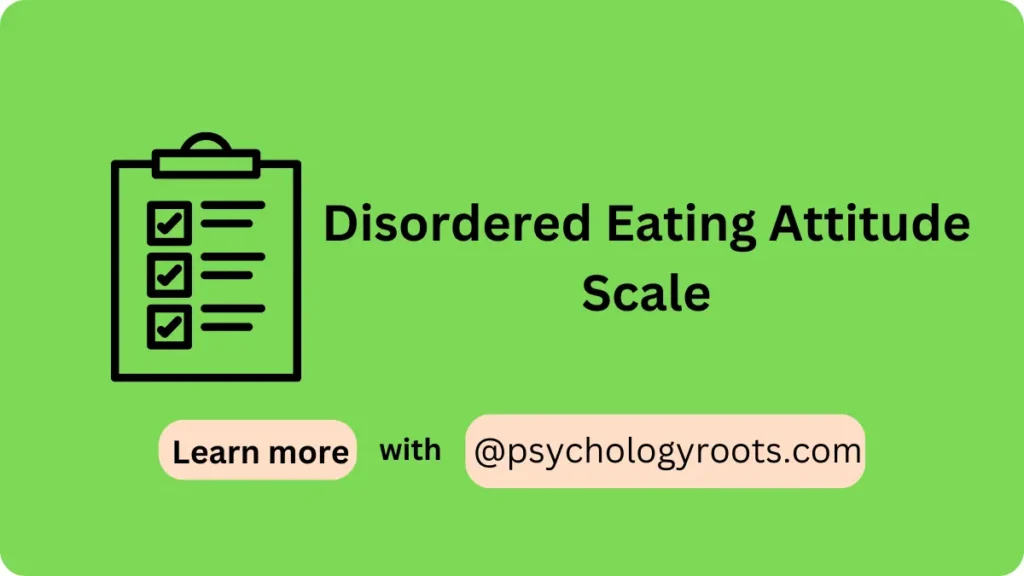Table of Contents
Disordered Eating Attitude Scale (DEAS)
Here in this post, we are sharing the “Disordered Eating Attitude Scale (DEAS)”. You can read psychometric and Author information. We have thousands of Scales and questionnaires in our collection (See Scales and Questionnaires). You can demand us any scale and questionnaires related to psychology through our community, and we will provide you with a short time. Keep visiting Psychology Roots.
About Disordered Eating Attitude Scale (DEAS)
Scale Name
Disordered Eating Attitude Scale (DEAS)
Author Details
Maria dos Santos Alvarenga, Francine B. Scagliusi, and Sonia Tucunduva Philippi
Translation Availability
Not Sure

Background/Description
The Disordered Eating Attitude Scale (DEAS), developed by Alvarenga, Scagliusi, and Philippi in 2010, was designed to assess attitudes and behaviors related to disordered eating. The scale aims to identify problematic thoughts and feelings toward food, body image, and eating, which are often precursors to more severe eating disorders such as anorexia nervosa, bulimia nervosa, and binge eating disorder.
The DEAS was created to bridge the gap in tools available for assessing eating attitudes, specifically in non-clinical populations. The authors recognized that early identification of disordered eating attitudes could help in preventing full-blown eating disorders. The scale is frequently used in both clinical and research settings, providing an efficient and reliable way to monitor the development of unhealthy attitudes toward eating.
The DEAS consists of multiple items that reflect different dimensions of eating behavior, such as control over eating, concern with weight and shape, emotional eating, and food-related anxiety. It is a critical tool for health professionals, psychologists, and researchers aiming to evaluate individuals’ eating attitudes in a reliable and valid way.
Administration, Scoring and Interpretation
- Target Population: The DEAS is suitable for adolescents and adults and can be used in both clinical and non-clinical settings.
- Format: The scale consists of 25 items that are divided into five dimensions related to disordered eating attitudes:
- Preoccupation with Weight and Dieting
- Eating Restraint
- Body Dissatisfaction
- Eating in Response to Emotions
- Social Pressure to Eat
- Rating Scale: The responses are given on a 6-point Likert scale, ranging from 1 (totally disagree) to 6 (totally agree).
- Administration Context: The DEAS can be self-administered or administered by a trained professional in both individual and group settings. It is especially useful in contexts where early identification of eating disorders is needed, such as schools, universities, and primary care facilities.
Reliability and Validity
The Disordered Eating Attitude Scale (DEAS) has demonstrated high reliability and validity in various samples. The internal consistency of the scale is robust, with Cronbach’s alpha values ranging between 0.85 and 0.93 across different subscales. The DEAS also shows excellent construct validity, as it correlates well with established measures of eating disorders and body image concerns.
Factor analysis confirms that the DEAS is a multidimensional tool, accurately capturing the different aspects of disordered eating attitudes. It has also been validated for use in both clinical and non-clinical populations, making it a flexible and reliable measure for diverse settings.
Available Versions
Multiple-Items
Reference
Alvarenga, M.dosS., Scagliusi, F. B., & Philippi, S. T. (2010). Development and validity of the Disordered Eating Attitude Scale (DEAS). Perceptual and motor skills, 110(2), 379–395. https://doi.org/10.2466/PMS.110.2.379-395
Important Link
Scale File:
Frequently Asked Questions
Q: What does the Disordered Eating Attitude Scale (DEAS) measure?
A: The DEAS measures attitudes and behaviors related to disordered eating, including concerns about weight, emotional eating, and body dissatisfaction.
Q: Who can use the DEAS?
A: The DEAS is suitable for use with adolescents and adults in clinical and non-clinical settings, including schools, healthcare facilities, and research studies.
Q: How is the DEAS scored?
A: The DEAS is scored based on the responses to its 25 items, with higher scores indicating stronger tendencies toward disordered eating attitudes. The scale is divided into five dimensions that can be analyzed separately or as a whole.
Q: Is the DEAS reliable?
A: Yes, the DEAS has demonstrated high reliability and validity, with strong internal consistency and excellent construct validity.
Q: Can the DEAS be used for clinical diagnosis?
A: While the DEAS is not a diagnostic tool, it can help identify individuals at risk for eating disorders and can be used to monitor changes in eating attitudes over time.
Disclaimer
Please note that Psychology Roots does not have the right to grant permission for the use of any psychological scales or assessments listed on its website. To use any scale or assessment, you must obtain permission directly from the author or translator of the tool. Psychology Roots provides information about various tools and their administration procedures, but it is your responsibility to obtain proper permissions before using any scale or assessment. If you need further information about an author’s contact details, please submit a query to the Psychology Roots team.
Help Us Improve This Article
Have you discovered an inaccuracy? We put out great effort to give accurate and scientifically trustworthy information to our readers. Please notify us if you discover any typographical or grammatical errors.
Make a comment. We acknowledge and appreciate your efforts.
Share With Us
If you have any scale or any material related to psychology kindly share it with us at psychologyroots@gmail.com. We help others on behalf of you.